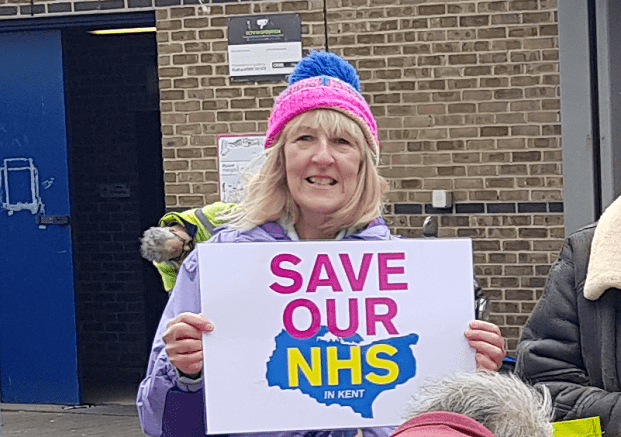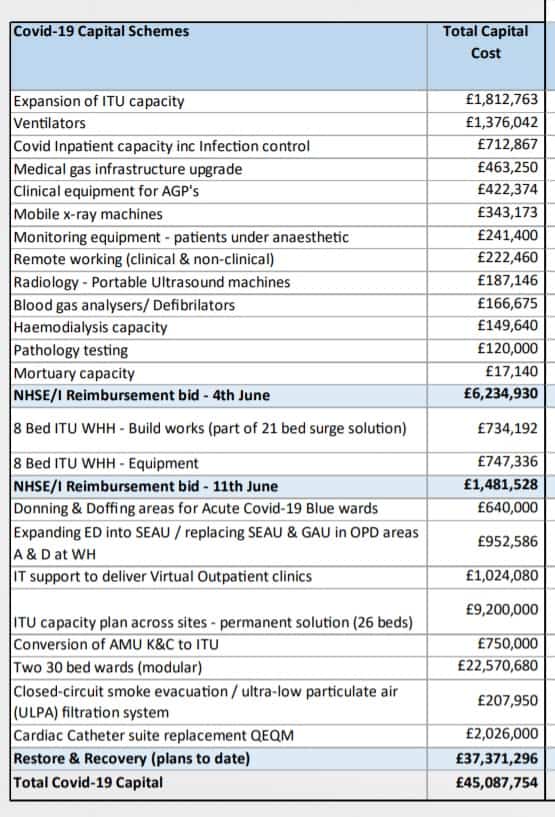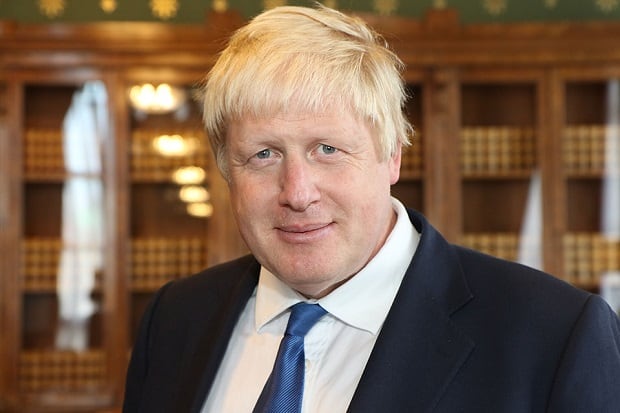
Government data mapping positive Covid cases by ‘ward equivalent’ areas show there were nine new confirmations of people with the virus between July 6-12 .
Six cases were recorded in the Margate town area and another three in St Peter’s (listed as Broadstairs North). No cases were confirmed in any other area of Thanet.
Find the map here
The total positive cases recorded for Thanet since the pandemic began stands at 874 with 146 people losing their lives up to July 3.

According to papers published by the East Kent Hospitals Trust board at the end of June there were 11 covid positive in-patients at QEQM Hospital in Margate, 43 at the William Harvey Hospital in Ashford and 5 in Kent and Canterbury Hospital.
Charting inpatient figures across April, May and June the performance report shows that these numbers are significantly below peaks in April and May.
At QEQM there was a peak of 53 inpatients in April and 44 in May before the drop to 11 by the end of June.
For WHH the April peak was 55 but in May this shot up to 89 before the drop to 43 at the end of June.
Kent and Canterbury experienced April and May highs of 23 inpatients before dropping to 5.
Losses and discharges
Across the Trust, which is one of largest in England, with five hospitals and community clinics serving a local population of around 695,000 people, there have been a total of 429 Covid-related deaths, according to figures from the NHS.
There have been 31 deaths of patients with Covid-19 recorded for this month (July 1-17), around 10% of the total (304) for England.
Data up to July 5 shows one patient on a mechanical ventilation unit, 52 inpatients, four deaths and 33 discharges.
By the end of June the East Kent Hospitals Trust board papers say it had discharged 701 patients who had recovered from Coronavirus.
Trust staff testing programme
The hospital trust is currently carrying out an accelerated programme to rapidly test all 9,000 staff for Covid-19 within the next five days due to suffering one of the highest death rates with Trusts across the country.
The Trust says it has already taken action to improve infection control, including limiting the number of people on site, wearing face masks at all times in the hospitals, temperature checks at entrances and testing asymptomatic patients regularly whilst they are in hospital.
The Trust is being supported by NHS England and NHS Improvement to strengthen its Infection Prevention and Control which includes the expertise of a specialist nurse and additional training for staff.

Salmestone ward councillor Candy Gregory (pictured), who is also a retired NHS worker and a member of campaign group Save Our NHS in Kent, said: “QEQM sits within my ward as a district councillor for Salmestone. I am very saddened that EKHUFT are again in the news for poor outcomes in care. This time for the high and seemingly disproportionate number of Covid-19 patients.
“I was a registered nurse before I retired last year, working in both hospital and community settings and took infection prevention, transmission and control very seriously. For EKHUFT to implement measures such as limiting visitors and taking their temperatures on entering buildings, staff wearing masks and being Covid tested is of course very welcome but I would like CEO Susan Acott to answer why this has only happened recently when the Covid-19 pandemic was on the radar in at least February 2020 if not before.”
‘Crisis’
County councillor Karen Constantine, who sits on the KCC health scrutiny panel, said: “We have a crisis in East Kent. We have the worst death rates and highest Covid-19 infection rates in the country. No other trust is having to make an attempt to test all its staff in this way.
“Whilst I hope this is successful of course, I am doubtful that it will be. Likewise I am concerned about how efficient our local track and trace system is. We need urgent help with infection control and we need a strong and clear public health message as it’s clear our local population is at risk from infection. We will need a further lockdown if this continues.”

A bid for £45million has been submitted to NHSE to cover the cost impact of Covid on the Trust so far, Funds committed include £1,812,763 on expanding ITU (Intensive Therapy Unit) capacity and £1.3 million on ventilators.
There is also spend of £734,192 for build works as part of a 21 bed ‘surge solution’ should cases spike again. The report says this is to ensure the ” ability to quickly repurpose and ‘surge’ capacity locally , should it be needed again.”
It is thought the Covid spend figure will reach £60million by the end of the 2020/21 financial year.
Across the UK 45,300 people who have had a positive test result for COVID-19, have died, 1,690 COVID-19 patients are currently in hospital and 143 are currently in mechanical ventilation beds.
In week 27 (ending July 3) 532 mentioned “novel coronavirus (COVID-19)”, the lowest number of deaths involving COVID-19 in the last 15 weeks, accounting for 5.8% of all deaths in England and Wales.

On Friday (July 17) Prime Minister Boris Johnson said the biggest ever flu vaccination programme in the history of the UK was to be rolled out and an additional £3 billion of funding will be given to the NHS in England to get ready for winter.
He said: “This will allow the NHS to continue to use the extra hospital capacity acquired from the independent sector and also to maintain the Nightingale hospitals until the end of March.
“This new funding comes on top of the additional £30 billion of funding for health and social care that we have already announced this year.
So we are making sure we are ready for winter, and planning for the worst. But even as we plan for the worst, I strongly believe we should also hope for the best.
That means looking ahead with optimism – now extending our plan to lift the remaining national measures which have restricted our lives since March so we can get back to something closer to normal life.”
The timetable laid out by the PM includes:
Anybody now being able use public transport.
From July 25, reopening of indoor gyms, pools and other sports facilities.
From August 1, employers given more discretion over where staff work and the reopening of most remaining leisure settings, such as bowling, skating rinks and casinos, and all close contact services such as beauticians to resume.
Nightclubs and soft play areas will need to remain closed for now – although this will be kept under review.
August 1 also will see the restart indoor performances to a live audience, subject to the success of pilots, with view to wider reopening in the Autumn.
Wedding receptions for up to 30 people to go ahead from the same date.
In September, schools, nurseries and colleges will be open for all children and young people on a full-time basis, and universities are also working to reopen as fully as possible.
From October, there are plans to bring back audiences in stadia and to allow conferences and other business events to recommence
More close contact between friends and family is anticipated for October too.
The PM added: “It is my strong and sincere hope that we will be able to review the outstanding restrictions and allow a more significant return to normality from November at the earliest – possibly in time for Christmas.”

